Hey YA Readers!
“What’s Up in YA?” is sponsored this week by Rachel Bateman’s Someone Else’s Summer from Running Press Kids.
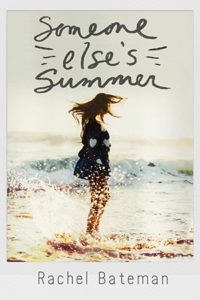 Anna’s always idolized her older sister, Storm. So when Storm dies in a tragic car accident on the night of her high school graduation, Anna is completely lost. That is, until she finds Storm’s summer bucket list and decides to honor her sister by having the best summer ever—which includes taking an epic road trip along with her sister’s best friend Cameron. Who knew that Storm’s dream summer would eventually lead to Anna’s own self-discovery?
Anna’s always idolized her older sister, Storm. So when Storm dies in a tragic car accident on the night of her high school graduation, Anna is completely lost. That is, until she finds Storm’s summer bucket list and decides to honor her sister by having the best summer ever—which includes taking an epic road trip along with her sister’s best friend Cameron. Who knew that Storm’s dream summer would eventually lead to Anna’s own self-discovery?
____________________
As a head’s up, there are mild 13 Reasons Why spoilers in here, but little in this discussion goes beyond what someone might have seen in a preview. Likewise, while this newsletter centers around the adaptation, the takeaways are applicable on a broader level, so no need to worry about knowing this specific story or book. It’s instead an example of a phenomenon in YA adaptations and in media for teens more broadly.
I think it goes without saying, but just to be safe: trigger warnings abound for discussion of suicide, mental illness, and sexual assault/rape. This newsletter is also quite lengthy, so take it in chunks as you need to — I’ve included at the end the commentary readers have sent in, making this a really wonderful and meaty discussion.
*
The longer that I’m away from watching of 13 Reasons Why, the more a lot of it leaves a bad taste in my mouth message-wise. There’ve been a number of great pieces written about this, of course, so I’m adding nothing to the discussion by saying there’s a huge gulf not explored in the story between mental illness and we should all be kind to one another. Where Clay’s big “ah ha” moment at the end is that we should be kinder to one another (at the expense, it seems, of listening to someone insist that they are okay and don’t want to be talked to), the viewer walks away knowing that there was something much more deeply troubling with Hannah. She was absolutely a victim of sexual violence and bullying, but knowing her deep desire was for someone to come rescue her, even after she pushed everyone away over and over, it’s frustrating and hugely disappointing that mental illness is not brought up or explored with depth. That the show ends with Alex at the hospital following an attempted suicide suggests that there might be a season two, and if that happens, this is an area that demands exploration.
That said, the biggest thing that bothered me with the show was a simple one: how old all of the characters looked.
It’s a well-known phenomenon that YA adaptations — most any teen-centered shows, really — generally cast actors who are outside of the target demographic. It’s part experience and part of who is available to do the work. It’s also a matter of legality. But with 13 Reasons Why, there’s a disturbing lack of trying to make these teens look like teens.
Case in point: if you’ve watched the show, have you noticed the tattoos? We’re not talking the kind of tattoos that an 18-year-old might get upon their birthday or the kinds of tattoos that a parent might let their teens get in high school. We’re talking large chest pieces, arm pieces, and other tattoos that are not only massive, but well-healed and aged.
Then there are the moments where the characters are nearly nude. Not the sex scenes, mind you, which, while a little beyond realistic for teen sex, aren’t unrealistic for teen sex on screen. The scenes in locker rooms or bedrooms where the bulk of the character’s body is undressed. There are clear signs of adult maturity, spots where body hair is too well groomed or muscles too defined for awkward teen bodies. Where faces are chiseled in ways that say “20-something who works out” rather than “17-year-old teen boy who plays football.”
Lest this sound like nitpicking, remember: from the beginning of the show, we know that Clay and Hannah are sophomores in high school. That means they’re 15 or 16, in later episodes, maybe 17. In many ways, those two are the most realistic looking to their ages, Hannah more so than Clay. But their friends and classmates are in the same age range, with, perhaps, an 18-year-old senior or two in the fray.
And yet, here are some of the teenagers as they appear on screen:
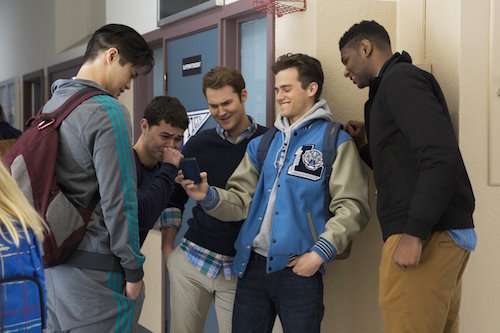
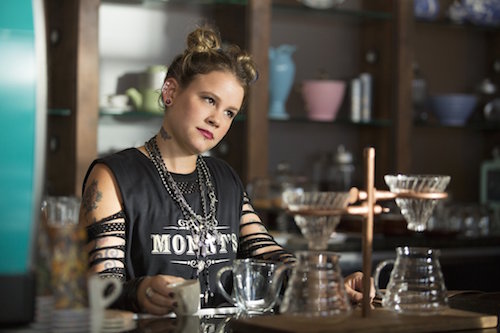 neck tattoos
neck tattoos
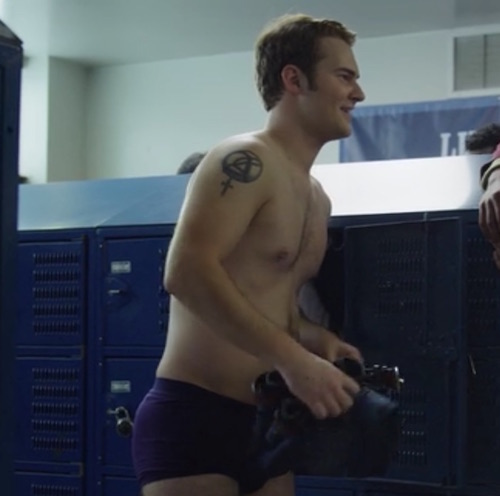
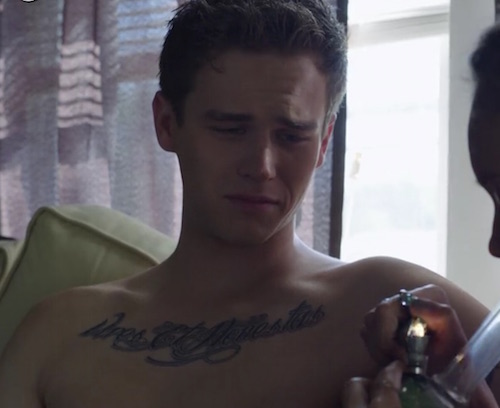
If you aren’t familiar with the “Actual teen vs adult teen” Tumblr, I highly recommend digging into it a bit. Liz Burns wrote about it a few years back, interviewing the creator Ann Foster. Foster has kept the Tumblr going, and I love how it puts this visual difference into perspective. She’s not yet done 13 Reasons Why but I suspect it’ll provide a lot of interesting visual comparisons.
It sounds nitpicky to find this representation of teens to be a problem, but by not even attempting to make these teenagers look like teenagers, imagine how easy it is to write off the problems they’re experiencing as things they’re equipped to deal with. The dude covered in tats? He’s old enough to make wise decisions, since he clearly had the capacity to make the decision to be inked. Those sexually active teens with super mature adult bodies? Obviously, they know how to handle dealing with grief and shame and the trauma surrounding the loss of a classmate (or a car accident that kills a classmate or a party that got out of hand or the consequences of repeat sexual violence or, or, or). Likewise, these teens might fall into that ever-loved category of “too stupid to live” that gets slapped unfairly on many YA characters who, remember, are teenagers.
Because the “teens” look like adults, the cognitive dissonance a viewer experiences — especially an adult viewer with little direct exposure or interactions with teens — is pretty significant. It would be easy to write off the deep problems these characters experience and more, easy to call some of what they do whining or childish, because they look like they’re big enough and wise enough to do something about it. But the truth is, that’s the point of the story: these teens are not wise or smart enough to do it.
There’s a big gap between the visual we’re presented and the depth of the story, and it’s there that much of the show falls apart.
It’s been said for quite a while that many don’t believe YA is for teens anymore or that it ever has been. That, thanks to the growth of the category via books like Twilight and The Hunger Games which brought to their franchises legions of adult fans, there’s no longer a space for teens to call their own in the book world. I’m not sure I entirely buy this argument as a whole; I believe we conflate some of the statistics about who is buying YA books with who is reading them (and ignoring things like the fact a new YA hardcover can cost $20 — a sizable chunk of change for a teenager but less so for a full-time working adult). I also think that we’re easily led into believing it because of marketing and how much YA marketing for big books (or books that are going to be made big) is geared toward adults, rather than teens. Again, probably in part due to who is buying the books, which ties back to where the money is. Not to mention it’s adults in the online world who tend to be writing blogs or newsletters or long form pieces about YA lit and it’s adults who are most likely consuming those same pieces.
And then we have adaptations like 13 Reasons Why which have at their core real, troubling issues teens may be dealing with personally. In cases like this, it’s easy to let our adult sensibilities take over because those teenagers look really. damn. mature. It’s also easy for us as adults to prescribe what we think are solutions to those situations from the outside. See, for example, the think pieces that have popped up about how troubling it is there weren’t more discussions in school about how suicide is a bad thing and not to do it. Aside from that not being true, in my own experience as a teenager in high school and in working with teens in various high schools, when suicides have occurred, the school’s response is often silence. There are many reasons for this that are boring and not story-worthy. They don’t heighten the drama, though in many cases, they certainly heighten the frustrations that students have, making their teen minds even more confused and hurt.
Teenagers are hormonal monsters made of whine and awkwardness, anger and rage, stupid decision making and obnoxiousness. This is what they are because this is what they’re biologically meant to be, as well as what they’re psychologically and socially molded to be. But they’re made this way for a reason. They are not mature enough to make great decisions because they don’t have the experience necessary to do so and their brains are literally not yet wired to think through the implications of their actions.
This is, perhaps, one of the reasons they make such interesting characters. It’s also why those who work with teens absolutely love working with them.
So when we turn a story like 13 Reasons Why into an adaptation and fill it with characters who don’t look even close to teen age, we take away those really tricky, sticky, tough pieces of being that age and instead, want to prescribe and dictate what we think reasonable adults should be doing. We’re not being primed by seeing them as greasy, smelly, messy teenagers with gangly, awkward bodies and minds. We’re seeing them as fully functioning, mature adults. We aren’t even being given the chance to empathize.
It might not sound like a problem when applied to a show — it is, but certainly not in the same capacity that it is a problem when those same mentalities are then applied to the real world. Because the truth is, they are and they will be applied. Again, the “too stupid to live” label comes to mind, as do the reviews and think pieces which prattle on about how whiny and dramatic teen characters in YA books can be. (They’re that way in real life, though, because they’re built to be that way).
But we can at least hope that those adult sensibilities might also include having a good, meaningful series of discussions about the show, about its faults, about its strengths, and about how powerful it is to share a conversation between adults and teens about the confusing, painful, and downright shitty parts of growing up.
____________________
Last week I asked readers to share some of their input on the show or links they’ve read that really got their attention. I’m copy/pasting them below, keeping them anonymous. I love that y’all responded and love that we can make this a place of discussion.
I’m a high school English teacher/reading specialist. I’ve read and taught the book in class, and students loved it.
My students love the show as well–I don’t know that they are catching *all* of the things that I catch–Clay masturbating to the picture of Hannah and Courtney, for instance, wasn’t caught by them. They are confused why I haven’t binged the show like they did. I’m ready for episode 6.
It’s a hard watch for me. The book was hard as well, but the show seems harder. And, I know what’s coming. I don’t know why it’s different, but it is.
Ultimately, I think it’s a show that raises important issues, but it does much of why the book does; leaves items open for interpretation. My students don’t see Hannah as manipulative or blaming others, but they see how she wants them to know. Yes, they know suicide is a choice, but we talk about bullying and sexual assault to our students so much they also know that there are factors that lead up to it. If it weren’t controversial, it probably wouldn’t be doing it’s job.
Though I don’t know him personally, I am friends with Jay Asher, the author of the novel, on Facebook. He played an integral part of the production of the series, and is aware of much of the issues that are playing out.
*
I’ve seen the interviews where Selena Gomez and other producers say that they showed the gratuitous violence because they wanted to show people that “suicide should never be an option” but, to me, it felt like they were making a show for people who have never gone through these things. People who have never self harmed, people who have never been suicidal, people who have never been sexually assaulted. Sadly, people who have been through all these things are the ones that the book really resonated with and the ones that were most looking forward to the show. My biggest problem with the show itself is that infamous suicide scene. I’m upset that they showed suicide in such a graphic way when there are plenty of suggested guidelines for what to do and what not to do when portraying a suicide on film, but that’s not all of it. They completely ignored a big part of Hannah’s character and her wants when they changed her method of suicide. Hannah wanted to use pills so that she wouldn’t feel the pain of dying, so that she’d be asleep when she died because she was still afraid of it. She wanted to use pills so that her parents could pretend it was an accident if they wanted to. She didn’t want a grisly scene for her parents to walk in on. If Jay Asher had just randomly chosen a way for Hannah to die and hadn’t given her specific reasons for the way she wanted to kill herself, I wouldn’t be nearly as angry about the show. To me, it feels like the show ignored Hannah’s character and changed the way she died because a death by pills wouldn’t be shocking enough. It wouldn’t be as action packed as slitting her wrists. There wouldn’t be enough intense drama to film. They chose to change her method of suicide purely for the shock value.
You mentioned the hype that Thirteen Reasons Why has been getting and you compared it to that of The Hunger Games, and I have some feelings on that too. So much of the media attention about the show horrifies me. There are quizzes about “which 13 reasons why character are you” and “which guy from 13 reasons why should you date.” There are memes, like the “welcome to your tape” meme, which is where if someone says something to upset you, you tell them “welcome to your tape.” One that’s particularly horrifying is a facebook copy and paste game? thing that I saw one of my facebook friends post. It said “let’s play 13 reasons why. drop your name in the comments and i’ll reply back tape or no tape. if i comment tape, you’d be one of my reasons. if i comment no tape, we’re cool.” She had 50+ comments! I’m not sure if people wanted validation that they haven’t done something to make them be a reason or what, but I was disgusted. When The Hunger Games came out, the media behind it was frightening. People immediately went for the starcrossed lovers trope and did the whole Team Peeta/Team Gale thing. There were countless blog posts about “how to look like you’re from the Capitol” and makeup campaigns to give you looks from the Capitol. The whole point of the books was missed. It wasn’t entirely the media’s fault, the movies messed it up pretty badly too, focusing on the love triangle and leaving out the worst parts of the Games. They pretty much completely left out the Avoxes, Peeta’s need of a prosthetic leg, Katniss’ hearing loss, their PTSD, the list goes on. The media for Thirteen Reasons Why is doing the same thing. They’re focusing on the love story between Clay and Hannah and making jokes about some of the most serious things.
*
Full Disclosure: I have not yet watched 13 Reasons Why, but I have read the book.
I am on the side of many people who see the story as a revenge fantasy. I don’t know if I’d say that it glamorizes suicide, but I don’t think it shows how PERMANENT this choice is. I would assume that, because Hannah is so present throughout the show, that it’d be easy to forget that she is no longer living even if “justice has been served”. Sharing the message that we must be kind and realize our actions affects others is such an important one. But where’s the talk about mental health? I’ve seen articles telling 13 Reasons Why fans that they’d probably enjoy Pretty Little Liars, which is so far from helpful in the mental health department.
I haven’t watched the show because I know it will upset me. I’m sensitive, I have depression, and I know I’m not personally strong enough. This article made me feel better about that: http://twloha.com/blog/in-response-to-13-reasons-why/
*
When I first heard about 13 Reasons Why being made into a TV series for Netflix, I was hesitantly excited simply because while it is a rather hard subject matter, it is also one that I believe should be discussed. However, having read what I have about it, I don’t believe I can watch the series.
Most of what I’ve read has come from this post at Teen Librarian Toolbox: http://www.teenlibrariantoolbox.com/2017/04/thinking-about-13-reasons-why-teens-mental-health-and-media/#comment-554439
I believe Karen Jensen explains her view quite well and brings up valid points against watching the TV series.
*
I am the grandmother of three 13 year old girls, a 12 year old Haitian girl, and a precocious 11 year old girl. These girls are voracious YA readers. Just for fun I have been reading along. Oh, my! They all loved The Outsiders. It is the gospel to them. So affected by the story. All the Bright Places dissed school counselors. Ugh! Speak offended me. The author dismissed all cheerleaders as slutty, cruel people. And as I said, the kids really buy it. Thirteen Reasons Why scares me. Suicide is so final. Not romantic. The girls have read these books but I am discouraging the show. We read Aristotle and Dante, better. Simon vs the Homo Sapiens Agenda was a good book to read but all of us wish it had been written by a Homo sapiens who had actually lived it. The Perks of Being a Wallflower at least gave us some hope.
I could go on and on. But I wish for more responsible writers. I want a protagonist who is strong and smart and survives.
Well, in parting the girls are also are reading Austen and Dickens. Classics and comics.
My concern, I guess, is how the books teens read affect their world view. It is not easy in school society.
*
People have been attacking 13 Reasons Why for many reasons. Yes, I agree Hannah was manipulative in her making of the tapes (i.e. using them to cast blame on others for her problems–justifiably or not)–and I definitely think she could’ve handled some things that happened to her better than she did.
I don’t think they romanticized the suicide scene like some do. She clearly was terrified (as evidenced by her heavy breathing) and the scene has haunted me since. How is slashing your wrists that deeply and bleeding to death romantic?
What bothered me the most was that she had to be driven by a rape and bullying to kill herself. Not every depressed teenager has been assaulted and raped and deemed the class slut. Non-sexually active teenagers (even those who’d want to have sex) get depressed. Teenagers who aren’t bullied try to commit suicide (and some succeed, unfortunately). I guess my main pet peeve was that sex, in whatever form–without or with consent, pinching an ass or rape–was a driving force behind Hannah’s suicide. Why does it have to be girl + depressed is because of some issue with sex. There are many other reasons why a teenage girl would be that depressed. It’s a case of, yet again, making a story about girl be all about sex and, thus, objectifying girls as sexual objects rather than as showing them as regular people. Yes, sex is on the minds of teenagers quite a lot. I’m not naive about that. I’m just wondering if the series put so much emphasis on that aspect just for the titillation factor. If they did it for that reason in the hope of getting more viewers, then I’m not so thrilled with it.
I think they could’ve ended each episode with a list of warning signals to watch out for and give people tips about what to do if they think someone might be thinking about killing themselves. It could save someone’s life, you never know. Isn’t it more important to stress suicide prevention versus dwelling on why someone chose to do it!?!?
*
I haven’t seen the show version of TRW, and I’m honestly not really planning on it as I’ve heard that it’s pretty graphic. But I did want to write in and express the frustration I’ve been feeling with people throwing the book under the bus with the show. Say what you will about it, that book has saved lives, and I don’t think that should be ignored. If even one teenager felt heard and validated by reading a story, that is important, and with this book, it’s way more than one. I feel like a significant part of the problem was the translation from book to screen, where reading about suicide is one thing, actually seeing it happen on screen is another (and also a pretty unnecessary decision on the part of the producers). I worry that in our (rightful) outrage, we are ignoring the good in the story, and there is some good! There are definitely problems and things are overly simplified, but for me, TRW was the first book that I read that had the guts to acknowledge that hey, teens can be brutally bullying and go through HARD STUFF and that I wasn’t the only suicidal teenager out there. That was a powerful truth for me as a person of intersecting marginalized identities who had pretty much no social support as a teen. My two cents, for what they’re worth.
*
I think it romanticizes suicide, which is extremely dangerous when it comes to teens and young adults who are struggling with depression and suicide. It has been seen in the past that doing this usually triggers a rise in young suicides. I’ve encountered numerous people in the last few weeks who suffer from depression that say this show brought on a depressive episode, and they wished they hadn’t watched it. I don’t want to say a show is to blame for a rise in suicidal tendencies, but that if a show wants to start a dialogue about suicide awareness, romanticizing it is entirely the wrong way to do it.
____________________
Thanks for being part of this community, friends. We’ll see you back here next week for a big link roundup.
-Kelly Jensen, @veronikellymars